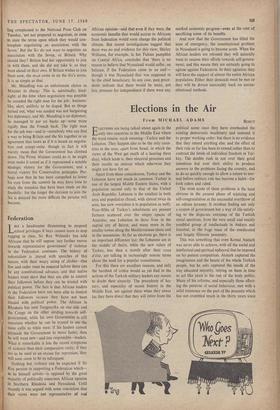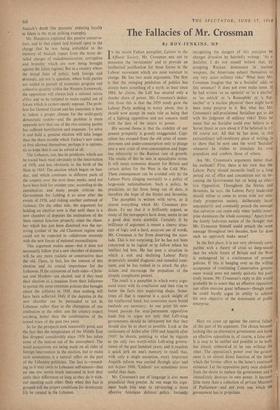Elections in the Air
From MICHAEL ADAMS
BEIRUT
ELEcrioNs are being talked about again in the only two countries in the Middle East where the word retains much meaning—Turkey and the Lebanon. They happen also to be the only coun- tries in the area, apart from Israel, in which the views of the West get much of a hearing these days, which lends to their electoral processes and their results an interest which otherwise they might not have for us.
Apart from these coincidences, Turkey and the Lebanon have not much in common. Turkey is one of the largest Middle Eastern States, with a population second only to that of the United Arab Republic; Lebanon is the smallest in both area and population (Israel, with almost twice its area, has now overtaken it in population as well). Four-fifths of Turkey's inhabitants are peasant farmers scattered over the empty spaces of Anatolia; one Lebanese in three lives in the capital city of Beirut, and many more in the smaller towns along the Mediterranean shore and in the mountains. As far as elections go, there is an important difference too; the Lebanese are in the middle of theirs, while the new rulers of Turkey, less than a month after their coup d'etat, are talking in increasingly remote terms about the need for a popular consultation.
For this there are excellent reasons, and only the harshest of critics would as yet find in the actions of the Turkish military leaders any reason to doubt their sincerity. The precedents of his- tory, and especialiy of recent history in the Middle East, are against them when they swear (as they have done) that they will retire from the political scene once they have overhauled the existing democratic machinery and restored it to proper working order; but there is no evidence that they intend anything else, and the effect of their rule so far has been to extend rather than to contract the limits of individual freedom in Tur- key. The doubts rush in not over their good intentions but over their ability to produce answers to the problems facing the country, and to do so quickly enough to allow a return to nor- mal before military rule has become a habit—for both rulers and ruled.
The most acute of these problems is the least obvious in the present phase of rejoicing and self-congratulation at the successful overthrow of an odious tyranny. It involves finding not only a system of government but a way of life satisfy- ing to the disparate extremes of the Turkish social spectrum, from the very small and mainly youthful group of intellectuals in Ankara and Istanbul, to the huge mass of the mneducated and largely illiterate peasantry.
This was something that even Kemal Ataturk was never able to achieve, with all the social and intellectual and spiritual upheaval that he imposed on his patient compatriots. Ataturk captured the imagination and the hearts of the whole Turkish people, but he only captured the minds of the tiny educated minority, relying on them in time to act like yeast in the rest of the body politic. Many of his reforms, and especially those affect- ing the patterns of social behaviour, met with a solid resistance on the part of the peasants which has not crumbled much in the thirty years since Ataturk's death (the peasants' enduring loyalty to Islam is the mast striking example).
Mr. Menderes exploited this passive conserva- tism, and to that extent laid himself open to the charge that he was being unfaithful to the memory of Ataturk (apart from the more de- tailed charges of maladministration, corruption and brutality which are now being brought against the fallen regime). But in a country where the broad lines of policy, both foreign and domestic, are not ir, question, where both parties are united in pursuit of economic progress and collective security within the Western framework, the opposition will always lack a rational raison d'etre and so be tempted to make capital out of forces which it cannot openly espouse. The prob- lem for General Gursel and his associates is how to induce a proper climate for the multi-party democratic system—and the problem is more apparent now that one of the two existing parties has suffered humiliation and exposure. To solve it and hold a genuine election will take longer than the three months which Turkey's new rulers at first allowed themselves; perhaps it is optimis- tic to hope that it can be solved at all.
The Lebanon, too, has its problems, which can be traced back most obviously to the insurrection of 1958, and less obviously to the birth of the State in 1943. The election which began on Sun- day, and which continues in different parts of the country over the next three weeks, need not have been held for another year, according to the constitution; and many people criticise the Government for holding it so soon after the events of 1958, and risking another outbreak of violence. On the other side, the argument for holding an election now is that until there is a new chamber of deputies the institutions of the State cannot function properly, since the cham- ber which has just been dissolved was the sur- viving symbol of the old Chamoun regime and could not be expected to collaborate sincerely with the new forces of national reconciliation.
This argument makes sense—but it does not necessarily follow that a new chamber of deputies will be any more realistic or constructive than the old. There, in fact, lies the interest of this election and its crucial importance for the Lebanese. If the extremists of both sides—Christ- ian and Moslem—are elected, and if they treat their election as a mandate from their followers to pursue the same extremist policies that brought about the collision in 1958, then nothing will have been achieved. Only if the deputies in the new chamber can be persuaded to act as Lebanese rather than as the champions of one confession or the other, can the country expect anything better than the continuation of the armed truce of the past two years So far the prospects look reasonably good, and the fact that the temperature of the Middle East has dropped considerably since 1958 has taken some of the tension out of the atmosphere. The usual accusations are being made on all sides of foreign intervention in the election, but to make such accusations is a natural reflex on the part of the Lebanese politician. The fact is—wound- ing as it may seem to Lebanese self-esteem—that no one else seems much interested in how they settle their differences so long as they do it with- out shooting each other. Only when thii fact is grasped will the proper conditions for democratic life be created in the Lebanon.











































 Previous page
Previous page